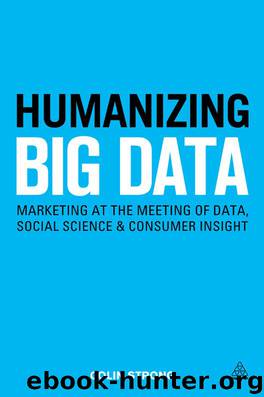Humanizing Big Data: Marketing at the Meeting of Data, Social Science and Consumer Insight by Colin Strong

Author:Colin Strong [Strong, Colin]
Language: eng
Format: epub, mobi
ISBN: 9780749472122
Publisher: Kogan Page
Published: 2015-03-02T23:00:00+00:00
So it is clear that we are in a position where we have imperfect information and limited computational capabilities in the context of a world where the different options are seemingly infinite. Humans, as Ormerod puts it, ‘can rarely if ever know in advance with any reliable degree of accuracy the consequences of their actions. They only have the vaguest idea.’7
Simplifying decision-making
Nevertheless, we make decisions. And behavioural economics has demonstrated that we employ an immense number of strategies to make it easier to take decisions. A good example of this is ‘fast and frugal decision making’ – how we behave frugally by employing as few pieces of information as possible to make a decision as fast as possible. We return to this theme in Chapter 12.
Another way in which we ease the process of decision-making was identified by Keynes, who wrote in 1937 that a good ‘rule of thumb’ is to copy other people, basing your decision on the actions of others you are aware of. Keynes said ‘knowing that our individual judgement is worthless, we endeavour to fall back on the judgement of the rest of the world, which is perhaps better informed’.8
And copying makes sense in many circumstances. Imagine you are in a small town on holiday and trying to decide which of a number of restaurants to dine in that evening. The menus appear similar, prices are very close and each has an attractive appearance. However, one restaurant has far more diners already sitting in there than the others. So which do you choose? Easy, it’s the one with more diners. You are relying on the information of others to inform your decision. So it is not mindless copying; rather, it is copying that draws rational inferences from limited information.
We manage our lives using an infinite number of unwritten rules. Even the simplest of tasks has a complex set of social interactions that are almost automatic and unconscious for us but for which there is a shared meaning and understanding. Our lives are ruled by this rich tapestry of social meanings that are so implicit that we tend to call them ‘common sense’.9
Download
Humanizing Big Data: Marketing at the Meeting of Data, Social Science and Consumer Insight by Colin Strong.mobi
This site does not store any files on its server. We only index and link to content provided by other sites. Please contact the content providers to delete copyright contents if any and email us, we'll remove relevant links or contents immediately.
| Direct | Global |
| Industrial | Multilevel |
| Product Management | Research |
| Telemarketing | Web Marketing |
Influence: The Psychology of Persuasion by Robert B. Cialdini(4782)
The Miracle Morning by Hal Elrod(4713)
The Hacking of the American Mind by Robert H. Lustig(4375)
Pre-Suasion: A Revolutionary Way to Influence and Persuade by Robert Cialdini(4224)
Unlabel: Selling You Without Selling Out by Marc Ecko(3658)
Ogilvy on Advertising by David Ogilvy(3604)
Hidden Persuasion: 33 psychological influence techniques in advertising by Marc Andrews & Matthijs van Leeuwen & Rick van Baaren(3552)
Purple Cow by Seth Godin(3197)
Who Can You Trust? by Rachel Botsman(3129)
Kick Ass in College: Highest Rated "How to Study in College" Book | 77 Ninja Study Skills Tips and Career Strategies | Motivational for College Students: A Guerrilla Guide to College Success by Fox Gunnar(3118)
The Marketing Plan Handbook: Develop Big-Picture Marketing Plans for Pennies on the Dollar by Robert W. Bly(3047)
This Is Marketing by Seth Godin(3028)
I Live in the Future & Here's How It Works by Nick Bilton(2993)
The Power of Broke by Daymond John(2975)
The Tipping Point by Malcolm Gladwell(2914)
Building a StoryBrand by Donald Miller(2896)
The 46 Rules of Genius: An Innovator's Guide to Creativity (Voices That Matter) by Marty Neumeier(2845)
Draw to Win: A Crash Course on How to Lead, Sell, and Innovate With Your Visual Mind by Dan Roam(2783)
Market Wizards by Jack D. Schwager(2697)
